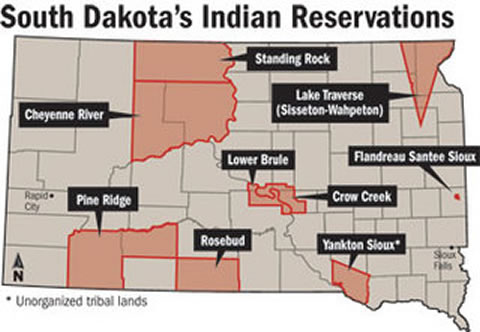 |
Canku Ota
|
 |
|
(Many Paths)
|
||
|
An Online Newsletter
Celebrating Native America
|
||
|
August
1, 2011 - Volume 9 Number 8
|
||
|
|
||
|
New Indian Education
Standards Aim for Respect
|
||
|
The South Dakota Board of Education on Monday adopted a set of core concepts and standards for teaching Native American history and culture that one former educator said could result in more "accurate and respectful instruction." Created over the past three years by mostly Native American educators, the Oceti Sakowin Essential Understandings and Standards will lead to changes in the way all South Dakota schools teach about the Lakota, Dakota and Nakota people. They include grade-level standards, corresponding activities and suggested resources for use in instruction, such as films, books and tribal organizations. "I would hope that it would finally lead to accurate and respectful instruction," said Stuart Zephier, a former Flandreau social studies teacher and high school principal, who helped developed the standards. The 2007 Indian Education Act mandated the development of a new curriculum for Native American history and culture. The curriculum will be developed later and woven into the state's standards for social studies and other subjects. Roger Campbell, the state's Indian education director, said the standards are meant for use in all schools, not just those with high Indian populations. However, they represent "a validated version" of what already is being taught on reservations. "We can have a reference point for everybody to go to," he said. "In Indian country (today), you may get a lot of different interpretations of the same material." Marcia Zephier, who teaches Native American Connections classes at Roosevelt High School, said the standards will bring a tribal point of view to instruction. "A lot of times what's written in our history book is from the European perspective and doesn't necessarily put us in the best light," Zephier said. "It's going to educate our kids about who we are as people; how we lived, how we governed ourselves, what our families were like." Stuart Zephier thinks that will improve race relations in the state over time. The essential understandings say, for example, that:
Oceti Sakowin Essential Understandings and Standards Essential understandings in Indian education"The original land base and natural resources of the Oceti Sakowin were under communal stewardship prior to immigrant settlement. The Oceti Sakowin tribes have a distinct and unique interrelationship with the environment that contributes to South Dakota." "There is variety and resiliency among individual tribal people as identity is developed, defined and redefined by entities, organization and people. A continuum of tribal identity, unique to each individual, ranges from assimilated to traditional lifestyle. There is no 'generic American Indian.' " "The origin, thought and philosophy of the Oceti Sakowin continues in the contemporary lifestyles of tribal members. Tribal cultures, traditions and languages are incorporated and are observed by many tribal members both on and off the reservations." "The Oceti Sakowin kinship systems provide a framework for both individual and group behavior. Its unwritten rules promote harmony, compromise, a sense of order, and group cohesion." "History told from the Oceti Sakowin perspective, through oral tradition and written accounts, frequently conflicts with the stories mainstream historians tell and becomes subjective information. Currently, historical perspective is being revisited to be more inclusive." "Federal policies and treaties put into place throughout American history have affected Oceti Sakowin people adversely. Tribes as sovereign nations have the authority to enter into government-to-government relationships. Currently, the relationships with the State are not the same for each tribe." "The essential philosophy of the Oceti Sakowin wicoun (way of life) is based on the values of the Oceti Sakowin, which has created resiliency of the Oyate. Tribal communities have put considerable efforts into economic development ventures, tribal universities, alternative education, wellness centers, cultural, traditions and language revitalization." More information on Indian education:
 |
|
|
||
|
|
||
| Canku Ota is a free Newsletter celebrating Native America, its traditions and accomplishments . We do not provide subscriber or visitor names to anyone. Some articles presented in Canku Ota may contain copyright material. We have received appropriate permissions for republishing any articles. Material appearing here is distributed without profit or monetary gain to those who have expressed an interest. This is in accordance with Title 17 U.S.C. Section 107. | ||
|
Canku Ota is a copyright ©
2000, 2001, 2002, 2003, 2004, 2005, 2006, 2007, 2008, 2009, 2010,
2011 of Vicki Barry and Paul Barry.
|
||
 |
 |
|
|
The "Canku
Ota - A Newsletter Celebrating Native America" web site and
its design is the
|
||
|
Copyright ©
1999, 2000, 2001, 2002, 2003, 2004, 2005,
2006, 2007, 2008, 2009, 2010, 2011
of Paul C. Barry.
|
||
|
All Rights Reserved.
|
||